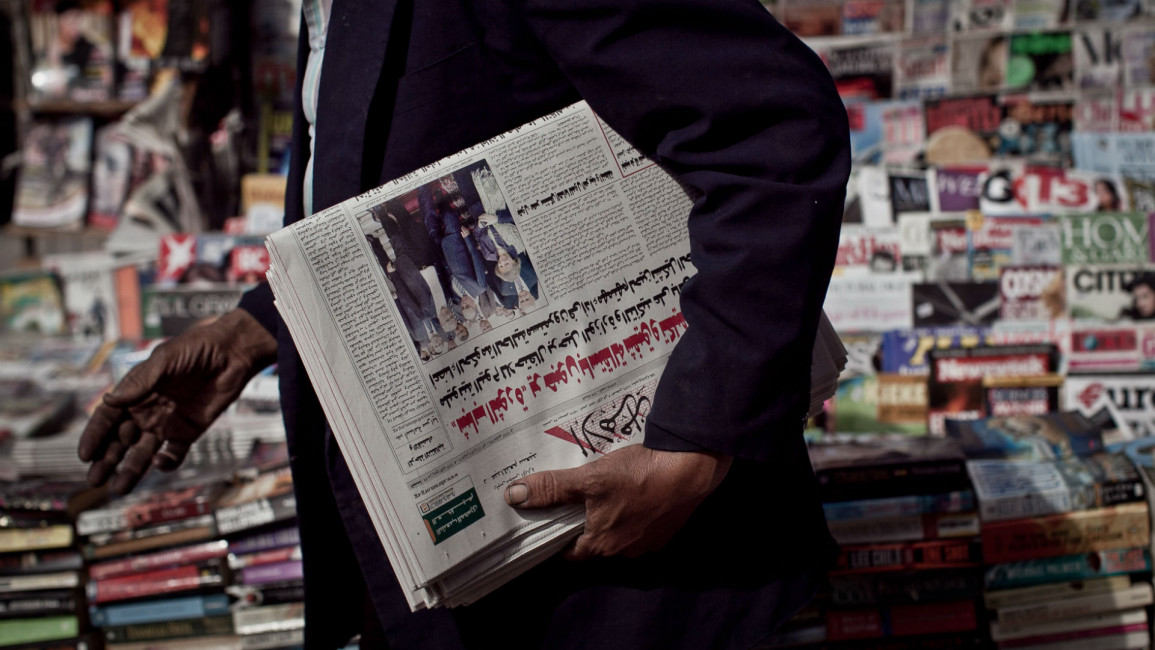
In Egypt, the slow death of journalism continues
But the Arab world's media landscape has long been among those under more direct, outward and generally unbridled control of the political leadership.
In some countries, the Arab Spring was a brief teaser of what journalism could look like, with slightly diminished levels of centralised control and censorship.
It was by no means a utopia, and businessmen along with political players (aspiring and established) stampeded the sector once it had been slightly opened to more diverse participation.
In Egypt, it was something of a free-for-all. Despite the political grandstanding and abuse of media ownership by some of the nouveau (media) riche, it was certainly a time when journalists felt that their chosen profession had taken on a new level of significance.
Suddenly, in 2011 the news and information in the country became of utmost importance, and on top of that, there was an almost unprecedented leeway to provide this information.
It was a short-lived period; barely two years. Since the current regime took power, one paper after another seems to have closed, andmost of the privately owned television stations have fallen into the hands of different governmental/security organisations.
 |
As always, national security is a caveat that trumps almost every legal consideration when it comes to journalism |  |
On coming to power, President Abdel Fattah el-Sisi had promised that media would be 'reorganised and regulated'. Finally, last week the Egyptian parliament approved three new draft laws regulating the functions of the Supreme Council for Media Regulation (SMRC), the National Media Authority, and the National Press Authority (NPA).
The need for more elaborate regulation of media and journalism in general was never in doubt, especially as much of the regulation had fallen under the defunct Ministry of Information, or the irrelevant Ministry of Investment. Other bodies such as the Press Syndicate, or the newly formed Higher Council for the Press along with the Egyptian Radio and Television Union all vied for position when it came to regulatory matters.
Twitter Post
|
Recently, it seemed that the judiciary was taking things into their own hands, which meant that any journalistic 'gaffe' (in the eyes of the courts) could be treated punitively, and they have been, extensively. According to the Committee to Protect Journalists (CPJ), in 2017 Egypt had one of the highest rates of journalist imprisonment, coming only in third place, after Turkey and China.
The new laws address the need to regulate and contain the necessary and somewhat ceremonial clauses involving financial regulation and guaranteeing - in theory - that journalists would not be imprisoned for "publishing crimes".
However, as always, national security is a caveat that trumps almost every legal consideration when it comes to journalism.
The institutions that govern journalism still maintain the function of the overbearing Big Brother that can decide when and if a journalist or a media outlet should be prosecuted for their work.
Also, control over a majority of the media outlets, especially the publicly owned ones, does not fall in the hands of journalists, but in the hands of board members within the overseeing bodies such as the NPA and the SMRC. These bodies may discipline journalists, select chairpersons of the boards and editors in chief, and identify "journalists with specialised expertise" who qualify for pensions.
This means a journalist would need to think twice before potentially angering these bodies - they are mostly appointed by apparatuses from within the regime - as vital issues such as their pension are at stake.
 |
The institutions that govern journalism still maintain the function of the overbearing Big Brother |  |
Most worryingly, the bill regulates social media presence in ways that it never has before. Any account with over 5,000 followers could be treated by the SMRC as a media outlet, granting it the power to regulate its content and demand registration.
Not only is journalism at stake here, but the space that has been carved outside the ever oppressive gaze and iron fist of the state is being closed in on, by a regime, that never really tolerated any sort of dissent of or hint of insubordination.
Read more: Egypt police arrest journalist amid wave of activist arrests
In a very informative article about the laws, columnist Abdullah el-Sinnawy sums it up succinctly, "The bill doesn't only restrain and limit journalists and newspapers, but places even social networking sites in that enclosure, applying also to content published on them.
"The bill goes against the Constitution in more than one of its provisions. Even the more minor details - the provisions on extending the retirement age for [select] journalists, for instance, are designed to reward journalists who gain authorities' favour and punish those who fall into their disfavour."
The manner in which the laws are said to have been passed, and the lack of true deliberation, clarify the fact that these clauses were largely not open for debate.
 |
Most worryingly, the bill regulates social media presence in ways that it never has before |  |
Members of the Journalists Syndicate are outspoken about their fears for the future of journalism under the current environment, especially as these new laws seem to be heavily skewed in favour of the authorities, be it the state or media managers.
Perhaps one of the more telling signs of this fear of journalists is the fact that the current syndicate head Abdelmohsen Salama, and staunch supporter of the current regime could not hide his reservations regarding the bill, how it was passed, and the marginal role afforded both to himself and the syndicate he represents.
Opinions expressed in this article remain those of the author and do not necessarily represent those of al-Araby al-Jadeed, its editorial board or staff.




